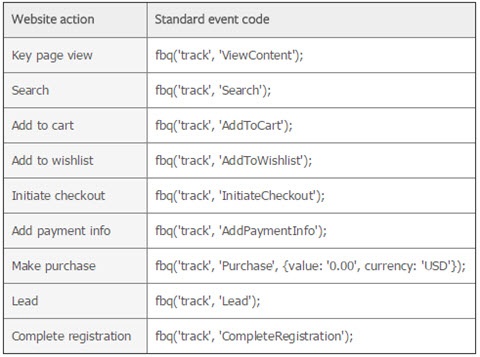Facebook Pixel is the most powerful part of running Facebook ads. It allows you to do everything from tracking sales to exact dollar amounts to creating retargeting audiences based on a user’s website behavior.
Facebook’s standard events are a big part of the Pixel, and Facebook has just added eight new standard events. In this article I’ll explain what they are and how they work.
What is a standard event?
A standard event is a common action on your website that you want to track. Previously, there were eight standard events that businesses could track. They were:
View Content – anyone who visits your website
Search – anyone who uses the search bar
Add to Cart – anyone who adds an item to their basket
Initiate Checkout – anyone who makes it to the checkout process
Add Payment Info – anyone who adds their payment info
Make Purchase – anyone who places an order
Lead – anyone who provides their email address
Complete Registration – anyone who signs up to your website

Facebook’s old set of standard events were super useful for businesses that did the bulk of their selling online. However, not every business is set up in the same way, and Facebook realizes that consumers shop differently when they buy a pair of shoes compared to a high-value item like a car or a home.
Facebook has now added eight new standard events. They are:
Contact – A telephone/SMS, email, chat, or other type of contact between a customer and your business
Customize Product – The customization of products through a configuration tool or other application your business owns
Donate – The donation of funds to your organization or cause
Find Location – When a person finds one of your locations via the web or an application with the intention of visiting (example: find product at a local store)
Schedule – The booking of an appointment to visit one of your locations
Start Trial – The start of a free trial of a product or service you offer (example: trial subscription)
Submit Application – The submission of an application for a product, service, or program you offer (example: credit card, educational program, or job)
Subscribe – The start of a paid subscription for a product or service you offer
These new events cater to more niches online and offline that require you to measure different actions. For example, SaaS companies can use the Start Trial event to better track how many users from Facebook take their trial. Bricks and mortar stores can use the Find Location and Contact events to see how Facebook impacts walk-in traffic. The Donate event can be used by nonprofits, and educational and financial services can use the Submit Application event.
How to use new standard events
The biggest benefit these eight new standard events provide is that you can better measure the path to conversion of your Facebook funnel.
While useful, the original standard events were limited and marketers would use them for other reasons than intended due to their limitations. For example, if they did not have an Add to Cart option on their site but a Start Trial option instead, they would treat the Add to Cart as a Start Trial event.
You’ll also be able to create better lookalikes for your intended goal; for example, if you’re running a campaign to drive free trial sign-ups, then a lookalike from the Start Trial standard event will help you drive cheaper trials than the View Content or Add to Cart events.
The more actions you can track, the better you can monitor and improve your Facebook funnel.
Do you see these new standard events?
Facebook stated that their eight new standard events will roll out mid-September all the way through to October. If you cannot use these new events right now, they should be available before the end of October.
How will you be using these new standard events?